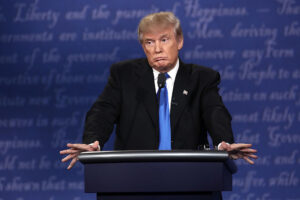Court Orders Peter Navarro To Hand Over Government Emails. NOW.
The court is perturbed.

(Photo by Win McNamee/Getty Images)
Yesterday Judge Colleen Kollar-Kotelly ordered Trump’s former economics advisor Peter Navarro to hand over the government emails he’s been hoarding on his Proton Mail account right now, denying his motion to stay her order pending appeal.
Of all the weirdos in Trumpland, Peter Navarro may be the weirdest. Plucked from obscurity by Jared Kushner as he trawled Amazon’s economics section for someone whose views on trade with China were as juvenile as the former president’s, Navarro became a jack of all trades in the Trump White House. From saddling the government with tens of millions of doses of hydroxychloroquine to magicking up memos “proving” that Biden could not possibly have won the election, there was no task Navarro didn’t feel up to. He even tried his hand at a little lay lawyering, first with the House coronavirus subcommittee and then with the January 6 Committee, where he explained that there was no law that could force him to testify.

A New AI-Powered Practice Management Platform With Flexible Deployment Options
This turned out to be a spectacular blunder, and he’s now facing charges for contempt of congress. But even now when he’s hired counsel, he continues to behave in ways which defy logic — and courts! Because it turns out that the same people who got elected by braying to put Hillary Clinton in email jail were somewhat less than scrupulously adherent to federal record-keeping laws when they got to the White House. And Navarro was one of many, many Trump staffers who used their private email accounts to conduct official business and then failed to send copies to their official accounts in accordance with the Presidential Records Act. But Navarro was unique in one respect, because almost everyone else complied with the law when they got caught.
But not our buddy Ron Vara! This guy spent upwards of a year telling the National Archives to pound sand, forcing the government to file a replevin action to get him to turn the documents over. The court was deeply unimpressed with Navarro’s argument that the Presidential Records Act (PRA) contained no enforcement mechanism, or alternatively that the PRA had no deadline, so Navarro could just hang onto the emails indefinitely. On March 9, Judge Kollar-Kotelly ordered Navarro to hand the documents over.
But still he persisted. On March 22, Navarro noticed his appeal, and only then did he file a motion to stay the March 9 order to produce the documents.
In an unmistakably irate minute order on the 23rd, the court ordered an expedited briefing on the merits, noting that the defendant was out of compliance with the court’s prior ruling.
Sponsored

Generative AI at Work: Boosting e-Discovery Efficiency for Corporate Legal Teams

Happy Lawyers, Better Results The Key To Thriving In Tough Times

AI Presents Both Opportunities And Risks For Lawyers. Are You Prepared?

Generative AI at Work: Boosting e-Discovery Efficiency for Corporate Legal Teams
Plaintiff shall file its opposition on or before March 25, 2023 at 10:00 AM ET, and Defendant shall file his reply on or before March 26, 2023 at 5:00 PM ET. The Court briefly notes that, on March 9, 2023, it ordered Defendant to comply with the Court’s order to produce a category of documents “forthwith.” “Forthwith” means “immediately; without delay.” Forthwith, Black’s Law Dictionary (9th ed. 2009). It would appear that Defendant did not comply with that portion of the order to produce some documents forthwith prior to filing for a stay. Signed by Judge Colleen Kollar-Kotelly on March 23, 2023.
And today’s ruling was no less emphatic.
“In florid terms, Defendant argues that this is a case of first impression and any ruling against him undermines key constitutional precepts of federalism,” Judge Kollar-Kotelly wrote. “The Court disagrees.”
In language both furious and capable of being understood by a fourth grader, the court summarized the case:
But for Dr. Navarro’s former workplace, very little about this matter would be remarkable, much less novel. Defendant agrees that he took property belonging to his former employer. He does not want to return the property. It is not his private property, as he now seems to contend, but the government’s, as he previously conceded and as the Court has held. His former employer has sued for its return. As in myriad cases between private parties, replevin provides a cause of action for the return of wrongfully detained property. This Court joins others in extending replevin to an action for the return of public property. The Court shall not stay the writ.
Sponsored

A New AI-Powered Practice Management Platform With Flexible Deployment Options

Unveiling Hidden Deal Insights: GenAI For Powerful Negotiation And Exceptional Client Service
Absent an emergency stay from the DC Circuit (LOLOL), this would appear to be the end of the road for our pal Pete. But not the end of his legal troubles, since the criminal case proceeds apace.
US v. Navarro [Docket via Court Listener]
Liz Dye lives in Baltimore where she writes about law and politics.







